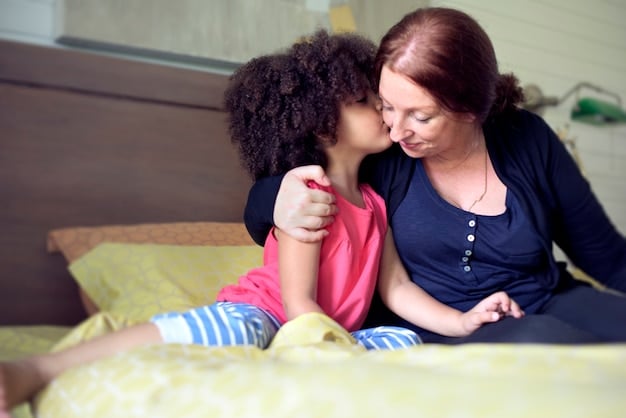How to Talk to Your Child About Childcare: US Parent Tips for 2025

Talking to your child about childcare in 2025 involves addressing their feelings, explaining the benefits, and preparing them for the experience, ensuring a smooth transition for both parent and child.
Navigating the world of childcare can be a complex journey, especially when little ones are involved. How to Talk to Your Child About Childcare: Tips for US Parents in 2025 aims to equip you with the insights and strategies needed to make this transition as smooth and positive as possible.
Understanding Your Child’s Feelings About Childcare
Before diving into logistics, recognizing and validating your child’s emotions is paramount. Children often experience a range of feelings, including anxiety, sadness, or even excitement, when faced with the prospect of starting childcare.
Creating an open dialogue where your child feels safe to express these feelings is a crucial first step in preparing them for childcare. Addressing these emotions with empathy can significantly ease their transition.
Identifying Common Emotions
Children may exhibit different emotions depending on their age and personality. Younger children might struggle with separation anxiety, while older kids might worry about fitting in or making new friends.
- Anxiety: Fear of the unknown is common.
- Sadness: Missing parents or familiar surroundings.
- Excitement: Anticipation of new experiences and friends.
- Confusion: Difficulty understanding the concept of childcare.
Regardless of the specific emotion, actively listening and acknowledging your child’s concerns will help them feel understood and supported.
By tuning into your child’s emotional state, you can address their worries head-on and foster a sense of security. This initial understanding is essential for building a positive association with childcare.
Choosing the Right Time and Place for the Conversation
The environment in which you broach the subject of childcare is just as important as the conversation itself. Selecting a comfortable and familiar setting can help your child feel more at ease.
Timing the discussion when your child is relaxed and receptive can also make a significant difference. Avoid bringing it up when they are tired, hungry, or already stressed.
Creating a Comfortable Atmosphere
Choose a quiet place where you can have an uninterrupted conversation with your child. This might be in their bedroom, during a relaxed family meal, or while doing a favorite activity together.
- Minimize Distractions: Turn off the TV and put away electronic devices.
- Be Present: Give your child your undivided attention.
- Offer Comfort: Have their favorite toy or blanket nearby.
The goal is to create an environment where your child feels safe and supported, making them more likely to engage in an open and honest conversation about childcare.
By carefully selecting the timing and location, you can set the stage for a more positive and productive dialogue about childcare, reducing anxiety and promoting understanding.
Explaining Childcare in Age-Appropriate Terms
How you explain childcare to your child should be tailored to their age and developmental stage. Using simple language and relatable examples can help them understand what to expect.
For younger children, focus on the fun activities and nurturing caregivers they will encounter. Older children might be more interested in the social aspects and learning opportunities.

Strategies for Different Age Groups
Adapting your approach based on your child’s age can make a significant difference in their understanding and acceptance of childcare.
For preschoolers, visualizing the routine can be effective in calming their fears and exciting them about their time at the new center.
- Toddlers: Use simple words and focus on the fun activities.
- Preschoolers: Explain the daily routine and the caregivers they will meet.
- School-Aged Children: Discuss the social aspects and learning opportunities.
Regardless of age, be prepared to answer their questions honestly and reassuringly. Your child’s understanding of childcare will directly impact their willingness to embrace the experience.
By tailoring your explanation to your child’s developmental level, you can help them feel more informed and confident about starting childcare. This age-appropriate approach is essential for building trust and reducing anxiety.
Highlighting the Benefits of Childcare
Focusing on the positive aspects of childcare can help your child view it as an exciting opportunity rather than a source of anxiety. Emphasize the fun activities, new friends, and learning experiences they will gain.
Highlighting the benefits can also alleviate any feelings of guilt your child might associate with you returning to work. Assure them that childcare is a positive choice for the entire family.
Emphasizing Fun and Learning
Frame childcare as a place where your child can explore their interests, develop new skills, and make lasting friendships. Share stories of other children who have enjoyed their childcare experience.
- Socialization: Making new friends and learning to share.
- Learning: Engaging in educational activities and developing new skills.
- Fun: Participating in games, crafts, and outdoor play.
By focusing on the enriching aspects of childcare, you can help your child see it as a valuable and enjoyable experience.
By accentuating the positive elements, you can shift your child’s perspective and foster a sense of anticipation for their time in childcare. This positive framing is key to a successful transition.
Addressing Common Concerns and Anxieties
It’s important to directly address any specific concerns or anxieties your child might have about childcare. Listen attentively to their fears and offer reassurance and practical solutions.
Validating their concerns shows that you take their feelings seriously and are committed to supporting them through this transition.
Offering Reassurance and Solutions
Depending on your child’s specific worries, you can offer various forms of reassurance.
Be prepared to openly discuss things on their mind – this may include concerns over whether you will miss them.
- Separation Anxiety: Emphasize that you will always come back.
- New Environments: Offer to visit the childcare center beforehand.
- Making Friends: Suggest ways to initiate conversations with other children.

By directly addressing their concerns and offering concrete solutions, you can alleviate their anxieties and build their confidence about starting childcare.
By proactively addressing your child’s anxieties, you demonstrate your unwavering support and commitment to their well-being. This reassurance is instrumental in fostering a positive attitude toward childcare.
Preparing for the First Day
In the lead-up to their first day, focus on preparing your child practically and emotionally.
Visits to the childcare center, role-playing, and establishing a goodbye routine can all smooth the transition, ensuring your children get over any worries they may have before their first day begins.
Practical and Emotional Preparation
Preparing them well in advance can also allow them to come to terms with what they are doing, and it can also excite them for the year.
- Visits: Arrange visits to the childcare center to familiarize them with the environment.
- Role-Playing: Practice the drop-off and pick-up routine at home.
- Goodbye Routine: Establish a consistent and comforting goodbye ritual.
By taking these proactive steps, you can empower your child to approach their first day with confidence and excitement.
By combining practical preparations with emotional support, you can create a positive and reassuring experience for your child as they embark on their childcare journey. This comprehensive approach sets the stage for a successful and happy transition.
| Key Point | Brief Description |
|---|---|
| 😊 Understanding Feelings | Acknowledge and validate your child’s emotions about childcare. |
| 🗣️ Age-Appropriate Explanations | Explain childcare in simple terms suitable for their age. |
| 🎉 Highlighting Benefits | Emphasize fun activities, new friends, and learning experiences. |
| 🤝 Addressing Concerns | Offer reassurance and practical solutions to alleviate anxieties. |
Ask questions that will further your understanding of how it works. What do you need to consider when talking about your child’s care?
FAQ
▼
Prepare your child by visiting the center beforehand, practicing the daily routine at home, and packing a comfort item. Talk positively about the experience and reassure them that you will return.
▼
Establish a quick and consistent goodbye routine. Reassure them that you will be back later, and trust the childcare providers to comfort and engage them. Avoid lingering, as it can prolong the distress.
▼
Acknowledge their feelings, but remain positive and confident. Provide them with a small reminder of home, like a photo or favorite toy. Discuss their day afterward and focus on the fun experiences they had.
▼
Highlight the fun activities, like playing with toys, making new friends, and learning new things. Show them pictures of the childcare center and talk positively about the caregivers and the environment.
▼
Visit the new center together, meet the caregivers, and participate in orientation activities. Talk about the positive aspects of the new environment and encourage them to ask questions and express their feelings.
Conclusion
Effectively communicating with your child about childcare is a crucial step in helping them adapt and view the experience as a positive step. By understanding their feelings, explaining the benefits, and preparing them for the transition, you can ensure a smooth beginning for everyone involved.





